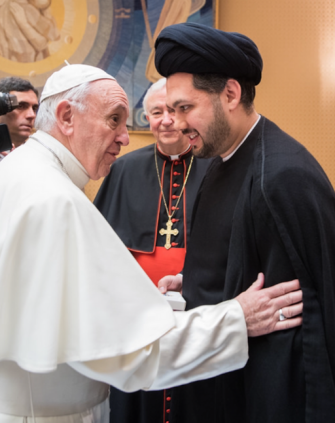Qur’an 114 People.
This is a prayer for protection against the Evil One, Satan.
The text
bi-smi Llâhi l-rahmâni l-rahîm
qul acûdhu bi-rabbi l-nâs
maliki l-nâs
ilahi l-nâs
min sharri l-waswâsi l-khannâs
alladhî yuwaswisu fi sudûri l-nâs
min al-jinnati wa-l-nâs
In the Name of God, the Lord of Mercy, the Give of Mercy
Say, ‘I seek refuge with the Lord of people, the Controller of people, the God of people,
against the harm of the slinking whisperer –
who whispers into the hearts of people –
whether they be jinn or people.
- Qur’an 114 Commentary
When the text is recited or read in Arabic it is noticeable that its rhyme is in ‘âs’ with a hissing sound, suggestive of a snake or a serpent. Satan appears as a serpent in the Bible tempting Adam and Eve (Genesis 3: 1-19). In the Qur’an Satan Shaytan or Iblis is not portrayed as a serpent, but he does tempt Adam and Eve by whispering to them (Q 2:36; 72; 20:120).
The name Satan is given in Q 114, the ‘slinking whisperer’ is very expressive; it shows that Satan does his work from behind, without letting himself be seen.
This sura is often copied, made into an amulet, and worn as a protection against evil.
Peter Sells writes: “In contemporary Islamic societies, the phrase ‘I take refuge in God (acudhu bi-lLah) is part of everyday conversation. On might pronounce the phrase upon hearing something shocking, absurd, or unbelievable, or on hearing oneself praised in a way that might lead to pride.” (Petger SELLS, Approaching the Qur’an. The Early Revelations, White Cloud Press, Ashland, Oregon, 20072 p.139).









Make A Comment
Comments (0)